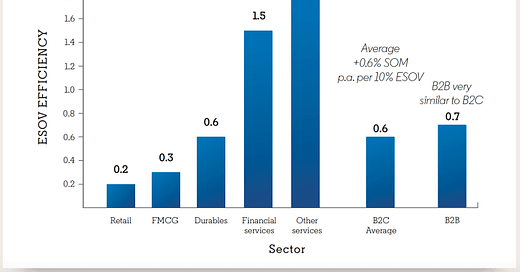The coming recession
and the opportunity it creates for marketers to grow their category share
It’s increasingly clear that the American economy is headed into a recession of our own making. This unforced error is coming on the heals of our economic recovery from the pandemic that was the envy of every other nation on earth. It’s likely that our erratic trade policies that seem to disproportionately victimize our most important trading partners abroad will also pull much of the free world into an economic downturn that will make the recession much harder to recover from. All of this appears due to the turmoil that’s been created by an administration motivated by vitriol, vituperation, vendetta and voracity (I am a sucker for alliteration).
It’s against this backdrop that I am writing today to remind so many of you that those marketers who invest in building their brand in an economic downturn almost always experience a meaningful gain in marketshare as a result. Time after time, studies have demonstrated that stalwart advertising investments in times of economic contraction build business to the delight of shareholders and the board. HBR’s “Don’t Cut Your Marketing Budget in a Recession” by Nirmalya Kumar and Koen Pauwels is a comprehensive case for this. And articles that have appeared in Kantar, The Drum, and AdWeek All chronicle other research that unequivocally makes the case for increased advertising investment in times of economic downturn.
If you think about, this totally makes sense; most enterprises make the mistake of looking at the economic downturn from a short term perspective only and pull back on their marketing investments, particularly advertising, because it’s usually the most fungible (think liquid) budget of significance. As a result of that, and usually fueled by the CFO’s ongoing skepticism of the true return on marketing and advertising investments, most marketers reduce their marketing and ad budgets thus opening the aperture for their more well-informed competitors who stay the course on their advertising strategy or even increase those investments to build demand at the expense of those who waffle.
Perhaps worst of all for those marketers electing to pare their investments in marketing and advertising, the cost of regaining the ground that they cede far and away exceeds the short-term ‘savings’ they garner by gutting their ad budgets. This is well documented in Case Study 2 in the Kantar piece that is linked above. Unfortunately, because most enterprises still see marketing as a cost center and not a revenue driver, they fail to think about the marketing ‘expense’ as the investment in their future that it truly is.
Pulling back on advertising also contributes to the severity and length of the recession. According to Perplexity.AI:
“Advertising significantly influences the U.S. economy, accounting for approximately 18.5% to 19% of U.S. GDP when considering direct, indirect, and induced effects. This includes $7.1 trillion in sales activity and supports millions of jobs across various industries.”
Most of the studies and articles linked above – and there are many more – reference “Excess Share of Voice” or ESOV. This provides a good rule of thumb for marketers who rightly see a recession as an opportunity to take share from less confident competitors. In very simple terms, an enterprise that has a 20% share of category sales and a 30% share of category voice (advertising impressions delivered in comparison to all other competitors) has a 10% ESOV. That “excess” share of voice will likely drive two to five share points of growth if sustained throughout the economic downturn.
Several of the pieces also highlight the need to retool your messaging strategy and creative executions in times when consumers are unsettled and often more conservative with their spending as a result. This is sage advice as tone-deaf messaging that fails to recognize the consumer mindset will negate the impact of the advertising investment and perhaps even damage the brand beyond the end of the recession.
So, my message to marketers and CFOs is simply this; don’t ignore what has been comprehensively proven, sustained advertising investments in times of economic uncertainty generally increase your market share and deliver the growth that you seek. Albert Einstein is often credited for coining the phrase: “The definition of insanity is doing the same thing over and over again and expecting a different result.” If you’re on a path to reduce your investment in advertising in response to the coming recession, then you will meet professor Einstein’s definition.





Nice piece, Lou! It reminds me of the (alleged) Henry Ford quote: “Stopping advertising to save money is like stopping your watch to save time.”
Thanks for sharing your wisdom Lou... pure logic stirred up with decades of expertise and case studies that prove your words to be fact. Growth in these challenging times is likely if we as marketers look around, evaluate the competition, the marketplace and most importantly the consumers we wish to do business with. WHEN our messaging serves consumers, business will thrive. While Brad quotes Henry Ford, I'll give a shout out to 'Beauty and the Beast" which reminds us that this is "A TALE AS OLD AS TIME".